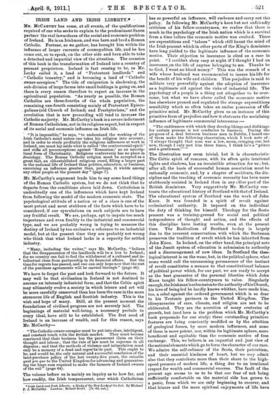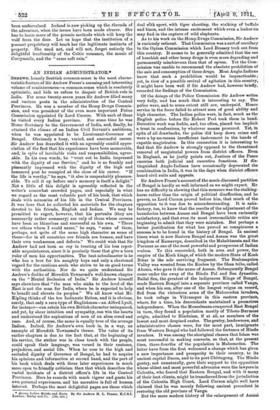IRISH LAND AND IRISH LIBERTY.* - MR. MCCARTHY bas some,
at all events, of the qualifications required of one who seeks to explain to the predominant Saxon partner the real inwardness of the social and economic problem of Ireland. He is an Irishman, and was born and bred a Roman Catholic. Fortune, so we gather, has brought him within the
influence of larger currents of cosmopolitan life, and he has come out, so to speak, on the other side and been able to take a detached and impartial view of the situation; The occasion of this book is the transformation of Ireland into a country of • peasant proprietors.. Ireland is fast ceasing to be, as Mr. Lecky called it, a land of "Protestant landlords" and , " Catholic tenantry," and is becoming a land of " Catholic owner-occupiers." The tide of emigration is slackening, the sub-division of large farms into smallholdings is going on, and there is every reason therefore to expect an increase in the . agricultural popnlation. "As nearly as possible, the Roman Catholics are three-fourths of the whole population, the remaining one-fourth consisting mainly of Protestant Episco-
. palians (old Church of Ireland) and Presbyterians," and the revolution that is now proceeding will tend to increase the , Catholic majority. Mr. McCarthy's book is a severe indictment of. Roman Catholicism, not in its religious aspect, but in respect of its social and economic influence on Irish life.
"It is impossible," he says, "to understand the working of the .Irish Catholic's mind unless one takes his religion into account ; and in order to study profitably the religious influences at work in Ireland, one must lay aside what is called ' the controversial spirit' and stifle all preconceptions against Romanism,' as an unscrip- tural form of Christianity. Religious controversy has no place in -Sociology.. The Roman Catholic religion must be accepted as a great fact, an old-established religious creed, filling a larger part in the national life of Ireland than politics, education, or business, -exercising an influence greater than, perhaps, it wields among any other people at the present day" (page 7).
Mr. McCarthy's argument leads him to say some bard things of the Roman Catholic system, but we do not think that he
departs from the conditions above laid down. Catholicism is undoubtedly one of the influences which have kept Ireland from following the model of the modern economic state. The -psychological attitude of a nation or of a class is one of the
most potent and most stubborn of the facts which have to be considered, if our speculations on such subjects are to have any fruitful result. We are, perhaps, apt to impute too much importance and even finality to the industrial and commercial type, and we are probably wrong in trying to measure the destiny of Ireland by too exclusive a reference to an industrial model, but at the present time they are probably not wrong who think that what Ireland lacks is a capacity for settled industry.
"Many, including the writer," says Mr. McCarthy, "believe that the disappearance of the landlords will be a loss to Ireland; for no country can-fail to feel the withdrawal of a cultured and in- • telleetual class from partnership in its financial affairs. But the time for regrets has passed, and one can only hope now that thereat of the purchase agreements will be carried through" (page 48).
We have to forget the past and look forward to the future. It may well be that civilisation in Ireland is not destined to assume an intensely industrial form, and that the Celtic spirit may ultimately evolve a society in which leisure and art will be more carefully conserved than has been the case in the more strenuous life of English and Scottish industry. This is the wish and hope of many. Still, at the present moment the foundations of civilised progress are not securely laid. The beginnings of material well-being, a necessary prelude to every ideal, have still to be established. The first need of Ireland is an increase of wealth, and for this reason, says Mr. McCarthy-
. " The Catholic owner-occupier must be put into close, intelligent, and constant touch with the British market. They must become convinced that their business has the paramount claim on their thought and labour ; that the rule of law must be supreme in all disputes ; and that the methods of violence and intimidation must only be a memory of a dead and regretta51e past. This ought to be, and would be, the only natural and successful conclusion of the land-purchase policy of the last twenty-five years, the suitable quid pro quo to the United Kingdom for advancing and guarantee- ing the huge sumrequired to make the farmers of Ireland owners of the soil" (page 64).
The volume before us is mainly an inquiry as to how far, and bow readily, the Irish temperament, over which Catholicism
• Irish Land and /fish Liberty e a Study of the New Lords of the Soil. By Michael F. J. McCarthy. London Robeit Scott. [7s. 6d. net.]
has so powerful an influence, will embrace and carry out this policy. In following Mr. McCarthy's keen but not unfriendly criticism of his fellow-countrymen, we realise that there is much in the psychology of the Irish nation which is a survival from a time before the economic motive was evolved. There are superstitions and "taboos " which still haunt the mind of the Irish peasant which in other parts of the King's dominions have long yielded to the legitimate influence of the economic motive. Their objection to insurance is cited as a case in point. "I couldn'-t sleep easy at night-if I thought I had an insurance on the life of anyone belonging to me. Thanks be to God, I want no blood money." This was the remark of a wife whose husband was recommended to insure his life for the benefit of his wife and children. This prejudice is said to militate very powerfully against the adoption of insurance as a legitimate aid against the risks of industrial life. The psychology of a people is a thing not altogether to be over- come, but what we have above called the economic motive has elsewhere pruned and regulated the strange superstitions sensibility which so often takes an undue possession of tCe primitive mind. Mr. McCarthy gives us an instance of this primitive form of prejudice and how it obstructs the socialising influence of legitimate commercial intercourse :=
"The suddenness with which they develop likings and dislikings for 'certain persons is not conducive to business. During the progress of a deal between business men in Dublin, I heard one of them make the following observation, which I took note of : 'I always thought that man was a low, mean, cringing cur, but now, though I only met him three times, I think he's a "prince -and a gentleman." " The illustration may seem trivial, but it is characteristic- The Celtic spirit of romance, with its often quite irrational lights and'shadows, has an irresistible attraction for us ; but, after all, the basis of successful human association must be rationally economic, and, by a chapter of accidents, the dis- cipline and the teaching of economic necessity has been more stubbornly resisted in Ireland than in any ether part of the British dominions. Very suggestively Mr. McCarthy con- trasts the educational history of Scotland with thatof Ireland. The educational system of Scotland was the work of John Knox. It was founded in a spirit of revolt against
ecclesiastical authority. It imposed on the individual the duty of thinking for himself. Theology for the Scots peasant was a training-ground for social and political independence of thought and action, and the effects of this discipline have lasting results, even at the present time. The Radicalism of Scotland today is largely
due to the reverent conservatism with which the Scotsman preserves the tradition of revolt which he has inherited from John Knox. In Ireland, on the other hand, the principal note of the Jesuit system of education is submission to authority and a discouragement of new ideas. In Scotland the theo-
logical interest is on the wane, but, in the political sphere, what some would call the unreasoning permanence of the instinct of revolt constitutes a menace to that constitutional balance of political power which, for our part, we are ready to accept as the best guarantee of the personal liberties which John Knox taught his fellow-countrymen to value. Singularly enough, the Irishman's submission to the authority of his Church, his love of being led he hardly knows whither, have made him, too, a rebel against the ordered government which is so dear to his Teutonic partners in the 'United Kingdom. The idiosyncracies of race, climate, and religion are not to be obliterated. They are the accretion of many centuries of growth, but (and here is the problem which Mr. McCarthy's book propounds for our study) these outstanding primitive
features are being constantly modified as by the attrition
of geological forces, by more modern influences, and none of these is more potent, nor, within its legitimate sphere, more beneficent and equitable than the economic motive of free exchange. This, we believe, is an impartial and just view of thenational elements which go to form the character of our race. We admire the self-reliance of the Scots, their patriotism,
and their essential kindness of heart, but we may admit also that they contribute more than their share to the high- speed pressure of modern life, a thing due to an irrational
respect for wealth and commercial success. The fault of the present age seems to us to be that our fear of not being sufficiently comfortable on the material side has grown to a panic, from which we are only beginning to recover, and that leisure and the more spiritual enjoyments of life have
-been undervalued. Treland is now picking up the .threads of the adventure, when the issues have been made clearer. She has to learn more of the prosaic methods which will keep the wolf from the door. Let us hope that the institution of a peasant proprietary will teach her the legitimate instincts of property. She need not, and will not, forget entirely the delightful irrationality of the Celtic romance, the music of Corryrueela, and the " same soft rain."











































 Previous page
Previous page